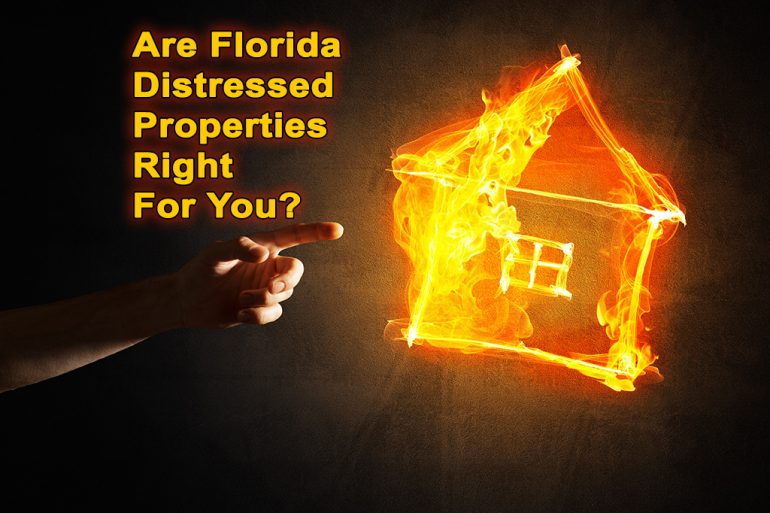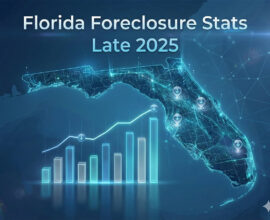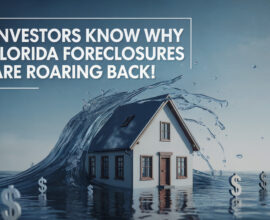Buying Distressed Property in South Florida?
Buying distressed property in South Florida are know across the country. Many out of state investors covet them and gun for them with large ad buys and canvasing efforts.
Where do they come from? There are times in life when the unfortunate happens and a property becomes distressed. A number of situations that could cause a property to be classified as distressed include:
- Financial strain due to job loss, medical issues, divorce or other situation.
- Immediate job relocation
- Foreclosure or short sale
- A death in the family
- Divorce
- Forced placed insurance, which has then caused a borrower to default
- Homeowner’s Association and condominium due liens and special assessments
- Tax deed sales
Buying distressed property can often be done at a price below the market value, making them attractive to investors for this reason. Foreclosure or short sale properties will be priced below market value, because the sellers are typically in a hurry to complete a sale and they do not want to (or do not have the ability to) spend the money that is needed in order to repair a property in order to list it at a higher price. When mortgage rates are low, a real estate investor may be able to take advantage of less expensive financing, purchase a property at a lower price and then sell it later for a profit. There are other advantages as well as disadvantages when purchasing South Florida distressed properties and both should be considered carefully prior to investing in a South Florida distressed property.
A disadvantage to buying distressed property is often the condition of the property. If you are purchasing a home that is in very poor condition, you will need to make sure you have the needed funds in order to employ the help of a contractor, purchase materials for the improvements, and complete the repairs to make the property ready for resale. Some foreclosure properties are in decent condition, but others may not have appliances, may have extensive damages to walls, and may also need significant repairs to electrical or plumbing. Informational home inspections may or may not be available for distressed properties, but even if you do have an informational home inspection, it is up to the purchaser to finance any necessary repairs.
It is also important to note that not all South Florida distressed properties meet the requirements of individual lenders, due to the condition of the properties. An appraisal is needed in order to attain financing and in order to qualify for certain loan products, a lender will need to assess and determine whether a property can be lived in and has value that is worth the risk in approving financing.
For someone who has some experience in fixing up homes or has trustworthy contacts through which one can hire a contractor, purchasing a South Florida distressed property that is in bad condition may in fact be a good deal. For someone who does not have experience in fixing up homes and does not have contacts that are trustworthy, through which one can hire a contractor that will help with the process, hiring a realtor and a home inspector to assist in assessing whether it is a wise decision to purchase the property and bring it to a re-saleable condition will likely be the best bet.
Many investors purchase South Florida distressed homes with cash, so one should be prepared to deal with potential competition from a cash buyer. If you do not have cash yourself, you may want to secure a strong loan prequalification and increase the size of your down payment in order to be a strong bidder.
The purchase of some South Florida distressed properties may also involve complex and lengthy paperwork before being able to take full possession of the property. This requires patience.
If you are interested in looking for a South Florida distressed property, there are a variety of ways to find these types of property, including:
- Real estate agents
- MLS
- Foreclosure auctions
- Tax lien auctions
- Short sales
- Local newspapers
- Lenders
For any type of investor, time is money. In order to find South Florida distressed properties for sale, cost effectively and efficiently, it makes the most sense for an investor to zone in on the larger pools of distressed homes. In order to do this, one would likely want to contact banks, mortgage lenders, servicers, credit unions, hedge funds and asset managers, which hold thousands of South Florida distressed properties.
The appeal of buying a home at a less-than-market-value price is undeniable, but there are points to consider apart from the condition of the home and potential competition from cash buyers. Other major differences to consider between purchasing a South Florida distressed property versus purchasing a non-distressed home conventionally are:
- Homes sold at auction can often have unforeseen liens and taxes that have not been paid. When you purchase a home on the open market, a third-party escrow company will do their due diligence in ensuring there are no existing liens on the property or other outstanding bills attached to the property. When you purchase a home at auction, the buyer is responsible for researching these types of things. “A lot of times, first-time buyers at auction have no idea what they’re getting themselves into,” says Svenja Gudell, Director of Economic Research at Zillow. “It can be a rude awakening if you get a great deal on a house and then owe $20,000 in back property taxes on it,” adds Gudell.
- Through a traditional home sale, there is more time to weigh the pros and cons of the investment and have a thorough property inspection completed, giving a potential home purchaser the ability to know exactly what they are getting themselves into with regard to damage and necessary repairs. “In a traditional sale, there’s a built-in contingency that protects your home buyers,” says Michael Corbett, author of Before You Buy. “Once you have a sale, you have seven to ten days to do an inspection and if there’s something wrong, you can walk away, negotiate for a better price or the owner will fix the problem,” Corbett adds. With many auction listings, particularly with foreclosure properties, thorough inspections are not permitted. Oftentimes, the institution that is holding the mortgage will only allow a potential buyer a few minutes to look over the property. For a first-time buyer or a fairly novice buyer, it is very important to eliminate surprises and stick to a budget in order to not end up with more debt than one started with versus making a wise investment and making a profit.
- The open market is typically filled with buyers and their real estate agents. In contrast, auctions are often dominated by experienced real estate investors and developers, who are very familiar with how much it will cost them to renovate a distressed property and how much their estimated rate of return will likely be. For this reason, it is important for a novice buyer to do research ahead of time as to what money is owed on the home, any liens against the property, and how much it could cost to make it ready to resell.
- With open market conventional sales prospective buyers have changed their minds time and time again for a variety of reasons, even forfeiting deposit monies. With an auction sale, however, the sale is final. Even if a buyer later finds out that there is an astronomical amount of money needed to cover back taxes and repairs, there is no going back on the sale completed at auction.
The purchase of a home is a big decision. Whether you are a novice buyer or an experienced investor, Buying distressed property in South Florida brings with it added responsibilities. Though the purchase of a South Florida distressed property may in fact prove to result in a positive return on investment and maybe even a lucrative one, any investor should expect to put extra security measures in place by doing their due diligence ahead of time and researching the property as much as possible. As with any wise investment, getting educated is the most important first step.







